Have you ever looked at your flock of chickens pecking away at the undergrowth and wondered, can chickens eat poison ivy? You’re not alone. This question has intrigued many backyard chicken keepers, including myself. The answer, surprisingly, is yes – chickens can indeed eat poison ivy without any apparent harm.
As an avid chicken keeper, I’ve often observed my hens foraging around plants that would cause nasty rashes in humans. Yet, they appear to eat these with gusto and face no apparent ill effects. It made me curious – what allows these feathery creatures to dine on what we consider toxic?
In this article, we’ll dive deeper into understanding chickens’ unique dietary abilities, the nature of poison ivy, and how chickens can help in its control. We will also explore potential impacts on chicken health and answer frequently asked questions. Let’s scratch beneath the surface and unravel this intriguing poultry paradox.
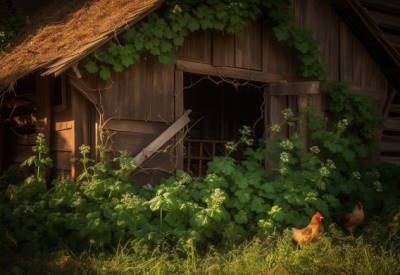
Understanding Chickens’ Diet
Every living creature has a unique dietary requirement, and chickens are no different. Let’s delve into the basics of what they eat and what they should not eat.
Basic Nutritional Needs of Chickens
Chickens are omnivores, meaning their diet can comprise both plants and animals. They require a balanced intake of proteins, carbohydrates, and vitamins, much of which they get from commercial poultry feed. Grains, seeds, vegetables, and occasional meat scraps are often a part of their diet.
Commonly Fed Food Items for Chickens
While chickens feast on various foods, grains, seeds, fruits, and vegetables typically constitute the bulk of their diet. Many chicken keepers also supplement their birds’ diets with table scraps, including bread, cooked rice, and pasta.
Dangerous Foods and Plants for Chickens
Not everything that chickens find appetizing is good for them. Certain foods and plants, such as chocolate, coffee grounds, green potatoes, and specific plants like foxglove and nightshade, can be harmful.
[ChickenAffiliate]
Exploring the Nature of Poison Ivy
Poison ivy can be a nuisance, especially for those who enjoy spending time outdoors. Let’s learn more about this notorious plant.
Overview of Poison Ivy: What it is and Where it Grows
Poison ivy is a plant commonly found in North America. It’s notorious for causing an itchy, blistering rash in humans, triggered by an oil called urushiol that the plant produces.
Toxic Components of Poison Ivy: Urushiol Explained
Urushiol is a sticky oil present in poison ivy. When someone touches poison ivy, the oil can stick to the skin, causing an allergic reaction that typically manifests as an itchy rash.
Effects of Poison Ivy on Humans and Animals
While most humans are allergic to poison ivy, not all animals are. Some animals, like deer and insects, can even consume poison ivy without apparent ill effects.
Can Chickens Eat Poison Ivy?
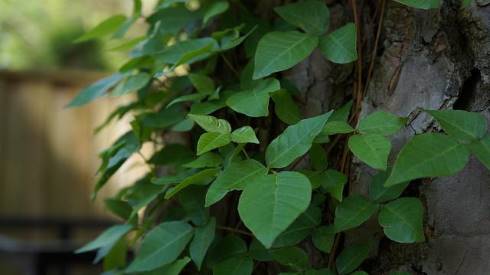
The question at the heart of our discussion is – can chickens eat poison ivy? Let’s explore what we know.
The Unique Digestive System of Chickens: How it Processes Different Foods
Chickens have a specialized digestive system designed to handle a variety of food items. Their gizzard, a muscular part of their stomach, helps grind food, including harder substances like seeds and grains.
Chickens and Poison Ivy: Anecdotal Evidence
Anecdotal evidence suggests that chickens can eat poison ivy without suffering from the ill effects commonly seen in humans. Many poultry keepers have reported their chickens feasting on poison ivy leaves with seemingly no negative impact.
Scientific Insight: Why Chickens Seemingly Remain Unaffected by Poison Ivy
Scientifically, the exact reason why chickens aren’t affected by poison ivy isn’t completely understood. It’s speculated that chickens’ unique digestive system effectively neutralizes the urushiol oil that causes allergic reactions in humans.
The Potential Impact of Poison Ivy on Chicken Health
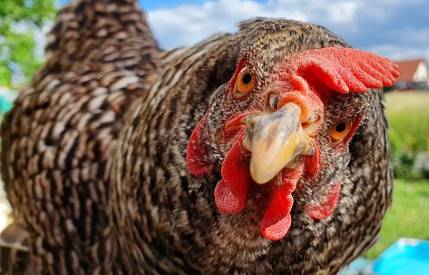
While chickens appear to eat poison ivy without immediate harm, what about the long-term effects? Let’s consider the potential impact on their health.
Possible Direct Health Implications: Observations and Studies
There is limited research on the direct health implications of chickens consuming poison ivy. However, based on observations from poultry owners, no significant health issues have been reported.
Indirect Consequences: Egg Production and Quality
Similarly, there hasn’t been any documented negative effect on egg production or egg quality in chickens that consume poison ivy.
Long-Term Effects: The Need for Further Research
While current evidence suggests that chickens can safely consume poison ivy, further research is needed to completely understand any potential long-term effects.
The Role of Chickens in Poison Ivy Control
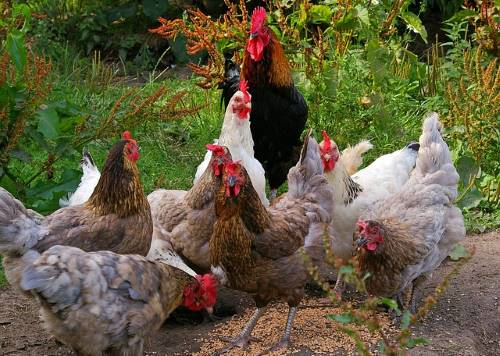
Chickens may play an unexpected role in controlling poison ivy infestations. Let’s look at the pros and cons of this approach.
Using Chickens as Natural Weed Controllers: Pros and Cons
On the plus side, chickens can help keep poison ivy in check by eating the leaves. However, there’s a risk they might also feed on desirable plants in your garden.
Safety Considerations for Employing Chickens in Poison Ivy Control
Before unleashing your chickens onto a patch of poison ivy, consider their overall safety. Ensure there aren’t any other potentially harmful plants nearby.
Case Studies: Successful Use of Chickens in Poison Ivy Eradication
There have been several successful instances of chickens being used to eradicate poison ivy. These cases provide hope for an eco-friendly solution to poison ivy control.
FAQs: Chickens and Poison Ivy
Finally, let’s address some frequently asked questions regarding chickens and poison ivy.
Will Chickens Actively Seek Out Poison Ivy to Eat?
Chickens don’t specifically seek out poison ivy. However, if it’s available, they will likely eat it.
Can Humans Contract Poison Ivy from Chickens that have Consumed the Plant?
While urushiol can stick to feathers, humans are unlikely to contract poison ivy from chickens. Still, washing your hands after handling chickens foraging in poison ivy is a good idea.
How to Deter Chickens from Eating Poison Ivy (if necessary)?
If you’d rather your chickens didn’t eat poison ivy, consider fencing off the area where the poison ivy grows.
Are there Other Poisonous Plants Chickens Seem Immune To?
Chickens seem unaffected by several plants that are poisonous to humans. However, not all potentially toxic plants are safe for chickens.
What to do if a Chicken Exhibits Adverse Symptoms After Eating Poison Ivy?
If a chicken seems unwell after eating poison ivy (or any other plant), consult a veterinarian as soon as possible.
Handling Chickens After They’ve Eaten Poison Ivy
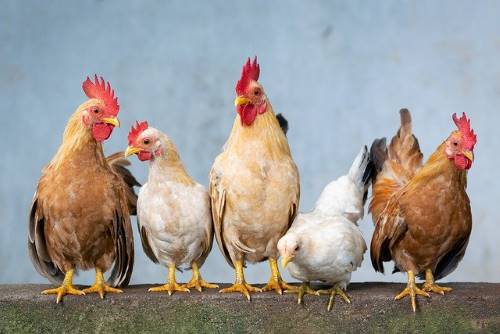
While your chickens may have a surprisingly superpower-like ability to eat poison ivy without harm, it’s important to take extra care when handling them post their poison ivy feast.
When chickens are foraging in areas where poison ivy is prevalent, the urushiol oil from the plant can potentially stick to their feathers. Remember, this is the same oil that causes those itchy and uncomfortable rashes in humans. So, what does this mean for you as a chicken keeper?
Direct Contact
Firstly, you should know that direct contact with your chickens could expose you to urushiol. Even though the risk is relatively low (as the oil would be somewhat diluted and would need to be on the chickens in a sufficient quantity to cause a reaction), it’s better to err on the side of caution.
Precautions When Handling Chickens
Here are a few steps you can take to minimize your risk:
- Wear Protective Clothing: If you know your chickens have been around poison ivy, wear long sleeves, gloves, and other protective clothing when handling them.
- Wash Your Hands: Always wash your hands thoroughly after handling your chickens or anything in their environment, especially if they have been foraging in areas with poison ivy.
- Clean Your Chickens: If you’re particularly sensitive to poison ivy, consider gently cleaning your chickens’ feathers with a mild, pet-safe shampoo to remove any potential traces of urushiol. Remember to rinse them thoroughly and keep them warm until they’re dry, as chickens can easily get cold when wet.
Keeping Your Coop Clean
Moreover, ensure that the coop and surrounding areas are kept clean. Regularly change bedding and nesting materials, particularly if they have been in contact with poison ivy.
In conclusion, while your chickens enjoy their poison ivy meal, make sure you stay safe and rash-free with these simple preventive measures.
What other plants can chickens eat?
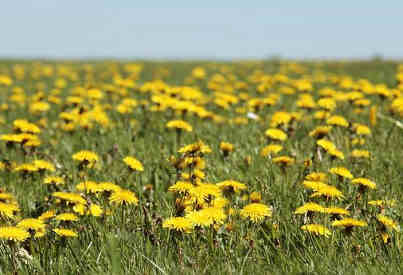
While poison ivy may be on the menu for our feathery friends, it’s certainly not the only plant chickens can safely nibble on. Chickens can add a bit of color to their diet by feasting on certain types of flowers. Here are five such flowers that serve as an eye-pleasing snack and may also have additional health benefits for your flock.
Dandelions
Dandelions are a big yes in the chicken world. These weeds, often despised by gardeners, are a treasure trove of nutrients for your chickens. Dandelions are rich in vitamins and minerals and provide a good source of antioxidants. Plus, chickens love them!
Read More: Can Chickens Eat Dandelions? Unveiling A Golden Feast
Comfrey
Comfrey is another plant that chickens can safely consume. This herb, known for its healing properties, is a good source of protein. It can contribute to your chickens’ overall well-being while serving as a yummy treat.
Read More: Can Chickens Eat Comfrey? 6 Excellent Benefits
Marigolds
Marigolds are not just beautiful; they’re beneficial for your chickens too. The petals of marigold flowers are known to contain antioxidants and can contribute to a deep, attractive yolk color when added to chickens’ diet. Just remember, moderation is key.
Read More: Can Chickens Eat Marigolds? 6 Surprising Benefits
Hibiscus
Hibiscus flowers, with their exotic appeal, are also chicken-friendly. The petals are safe for chickens to eat, and they’re often appreciated for their vibrant color and refreshing taste. Hibiscus can be an excellent treat for your chickens, especially in the hot summer months.
Read More: Can Chickens Eat Hibiscus? Discover Health Benefits & More
Carnations
Finally, carnations are on the approved list too. Chickens can safely peck at carnation petals. However, it’s worth noting that carnations are not as nutritionally rich as some of the other flowers mentioned. They should be offered more as a fun, occasional treat rather than a staple in their diet.
Read More: Can Chickens Eat Carnations? 5 Awesome Benefits
Can chickens eat poison ivy – final thoughts
So, can chickens eat poison ivy? To the surprise and delight of many, including this chicken-loving writer, the answer is a resounding cluck-yes! Our feathery friends not only munch on this notorious plant without a care in the world but also potentially serve as unexpected allies in controlling its spread.
As we’ve traversed through the wonder of chicken dietary habits and the oddity of poison ivy consumption, one thing has become clear – chickens are fascinating creatures, aren’t they? Not only are they champions of breakfast with their egg-laying prowess, but they also have superhero-like resistance to certain plants. Chickens eating poison ivy – just another feathery fact to add to our poultry trivia.
Related Articles:
